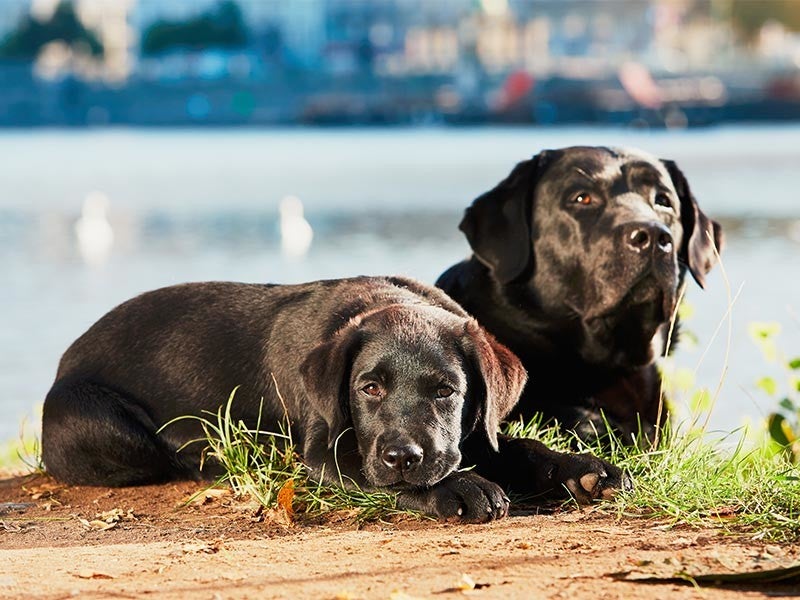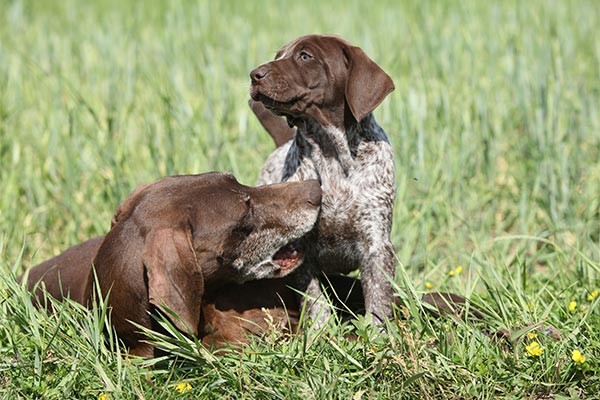
Joanna B. wrote that her daughter’s 10-month-old Labrador Retriever loves to get in the face of her adult Coton de Tulear, which responds by growling and snapping. The result is that the Lab puppy tries even harder to get close to the Coton.
It’s very common for families to bring home a new puppy when there is an older dog in the home. Here are some tips to help make a smooth introduction between dogs.
What’s Normal?
It is 100 percent normal for your adult dog(s) not to love a puppy. It’s OK for your adult dog not to want to be jumped on or be a chew toy for a new puppy. Dogs aren’t programmed to take care of youngsters. Your dog may want to go away from the puppy or may growl or even snap to tell the puppy to go away. However, if your older dog uses his teeth on the new puppy, that is not normal, and it may be time to consult with a veterinary behaviorist.
Communication Skills
Puppies do not have the canine communication skills of an adult dog. They don’t know how to be polite. Over time, the dogs and other puppies your new puppy interacts with will teach him proper canine manners. For now, your puppy is still learning, and his behavior can seem very rude to an adult dog.
Management and Supervision
Help give your adult dog a break from a goofy puppy. Having your dog crate trained is an excellent choice for many reasons and is helpful when bringing home a new puppy. If your puppy is bothering your dog, you can call the older dog and send him to his crate with a delicious chew toy. This rewards your dog for staying calm and shows him that you are there to keep him safe. You can also give your puppy time-outs in his crate. Giving each dog time to be on his own is important because it gives the older dog a break and helps teach the puppy to relax when alone.
Never leave high-value objects, such as bones or your dog’s favorite toys, on the floor with the dog and puppy. The puppy’s instinct to explore them may upset the adult dog and trigger resource guarding. Instead, keep these items picked up and only give out special treats when you can give one to each dog and be there to supervise.
Never leave your new puppy alone unsupervised with your adult dog. It’s much safer to place one or both dogs in a crate with a chew toy when you leave the house. It can take a few months for your adult dog and puppy to fully acclimate to each other.

Don’t Punish
Don’t punish your dog for growling at the puppy. Growling is normal dog communication, and he is letting the puppy (and you) know he’s had enough. Instead of punishing this important communication, calmly separate them.
Giving Attention
Make sure you continue to give your adult dog personal time with you. Maintaining the bond between you and your adult dog is just as important as building a bond with the new puppy. Your adult dog should continue receiving one-on-one play and training sessions. Using positive reinforcement with your adult dog while the puppy is around will also help your dog build a better association with the newcomer.
Be Patient
It takes time for dogs to get to know one another and make friends. Be patient as your adult dog learns to cope with a new puppy. Also, be patient as your new puppy learns the rules of your home and how to behave toward your current dog. Practice management, supervision, and positive reinforcement to help everyone learn to get along peacefully. Never hesitate to speak to your veterinarian or a dog trainer if you have any concerns about your dog getting along with your new puppy.
Our dogs are cherished members of our families, sharing our lives and providing unconditional love. But all dog owners know that our canine partners have different perspectives on life than our human family members.
If you have ever asked, “Why does my dog do that?” then this feature is for you. The AKC GoodDog! Helpline training team will answer your questions on dogs’ behavior and offer training advice to help you and your dog have the best relationship possible. The AKC GoodDog! Helpline is a seven-day-a-week telephone support service staffed by professional dog trainers. For more information on the service and how to enroll go to www.akcgooddoghelpline.org.

